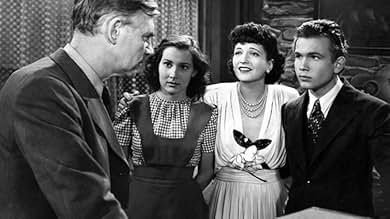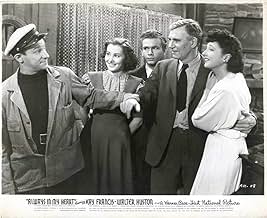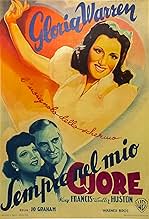IMDb RATING
6.2/10
549
YOUR RATING
After many years, MacKenzie Scott is pardoned from prison, but his wife is already involved with another man. Nevertheless, he travels incognito to his family's town. There he befriends his ... Read allAfter many years, MacKenzie Scott is pardoned from prison, but his wife is already involved with another man. Nevertheless, he travels incognito to his family's town. There he befriends his daughter Victoria, who doesn't recognize him, and encourages her musical abilities.After many years, MacKenzie Scott is pardoned from prison, but his wife is already involved with another man. Nevertheless, he travels incognito to his family's town. There he befriends his daughter Victoria, who doesn't recognize him, and encourages her musical abilities.
- Director
- Writers
- Stars
- Nominated for 1 Oscar
- 1 nomination total
Patti Hale
- Booley
- (as Patty Hale)
Borrah Minevitch and His Harmonica Rascals
- Harmonica Players
- (as Borrah Minevitch and His Rascals)
Leon Belasco
- Luke
- (uncredited)
- Director
- Writers
- All cast & crew
- Production, box office & more at IMDbPro
Featured reviews
Walter Huston and Kay Francis starred in this 1942 film.
Ms. Francis plays a middle class woman with 2 children, who supposedly is widowed. Wealthy Sidney Blackmer wishes to marry her.
It turns out that she is not widowed. She divorced her husband after he was sent to prison for killing a man. Both children have been told that their father is dead.
As Huston is about to be pardoned, Francis arrives at the prison to tell him that she is remarrying. Thinking only of her happiness and security for their children, Huston does not tell Francis of the pardon but instead encourages the marriage.
Huston, upon release, settles in a fishing area around San Francisco. Of course, he meets his children but says nothing.
Naturally, the children find out what they are and the film ends where he saves his son from a drunk and daughter, when she goes out in a storm in a boat.
There are some musical interludes in this as the daughter is training to be an opera singer. Huston does a little singing and there are several sequences where groups of fishermen turn to their harmonicas.
Ms. Francis plays a middle class woman with 2 children, who supposedly is widowed. Wealthy Sidney Blackmer wishes to marry her.
It turns out that she is not widowed. She divorced her husband after he was sent to prison for killing a man. Both children have been told that their father is dead.
As Huston is about to be pardoned, Francis arrives at the prison to tell him that she is remarrying. Thinking only of her happiness and security for their children, Huston does not tell Francis of the pardon but instead encourages the marriage.
Huston, upon release, settles in a fishing area around San Francisco. Of course, he meets his children but says nothing.
Naturally, the children find out what they are and the film ends where he saves his son from a drunk and daughter, when she goes out in a storm in a boat.
There are some musical interludes in this as the daughter is training to be an opera singer. Huston does a little singing and there are several sequences where groups of fishermen turn to their harmonicas.
Always In My Heart was taken from the play Fly Away Home which ran for 204 performances in 1935. In the original Broadway cast, Thomas Mitchell was the star in the role that Walter Huston played on screen. And a 15 year old Montgomery Clift made his stage debut in the role of the son.
During the interim before it reached the screen the film that became known as Always In My Heart was adapted for the wartime present. It also became a musical of sorts with one original song written for it, You're Always In My Heart and some classical and standard pop songs filling out the score. Because it was a musical the emphasis went away from the son and father to the daughter and father with Gloria Warren who Jack Warner was obviously building up to be his answer to Universal's Deanna Durbin. Warren sang pretty, but never quite made it as a second Durbin.
Walter Huston is the father of Frankie Thomas and Gloria Warren who was in jail for about 15 years and was pardoned. During that time he divorced their mother Kay Francis at his insistence. He figured he was going to be in jail for life as that was the sentence meted out to him for a homicide of a business partner who doubledealed him. The kids were told he died and Francis is now ready to marry the stuffy, but rich Sidney Blackmer.
Stopping by the house and not meeting Francis, Huston ingratiates himself with Warren when he tunes her piano and in that displays the musical knowledge and gift he's passed on to Warren. They develop a relationship of sorts as Huston decides to hang around see his kids for a few days before exiting their lives.
Thomas is getting his hormones in an uproar over the sexy Amida on this California coast town, but she's only using him to make her boy friend Anthony Caruso jealous. He's in need of some fatherly advice even if he doesn't know it's his father. As for Warren she likes singing with the poor fisher folk living on the wharves with their harmonica band led by Borrah Minevitch. Blackmer does not approve of her associating with the lower classes.
Towards the downside of her career, Kay Francis gradually transitioned into mother roles, if the film had been done at MGM, Greer Garson might have been cast. She and Huston do well together in their joint scenes.
The title song for Always In My Heart received an Academy Award nomination as the Best Song, the only nomination the film received. But this was the year of White Christmas and no other song was going to win the Oscar that year.
Certain things in the film tell me that the original play was a great deal more serious. The changes were made in keeping with wartime years as Gloria Warren the Harmonica Rascals led by Borrah Minevitch were aiming at both a USO show and a big radio contract. Of course Warren is also aiming to study seriously as well.
The changes leave Always In My Heart quite a hybrid film, not quite drama and not quite comedy. Still it's a pleasant enough film with the cast doing very well by their roles.
During the interim before it reached the screen the film that became known as Always In My Heart was adapted for the wartime present. It also became a musical of sorts with one original song written for it, You're Always In My Heart and some classical and standard pop songs filling out the score. Because it was a musical the emphasis went away from the son and father to the daughter and father with Gloria Warren who Jack Warner was obviously building up to be his answer to Universal's Deanna Durbin. Warren sang pretty, but never quite made it as a second Durbin.
Walter Huston is the father of Frankie Thomas and Gloria Warren who was in jail for about 15 years and was pardoned. During that time he divorced their mother Kay Francis at his insistence. He figured he was going to be in jail for life as that was the sentence meted out to him for a homicide of a business partner who doubledealed him. The kids were told he died and Francis is now ready to marry the stuffy, but rich Sidney Blackmer.
Stopping by the house and not meeting Francis, Huston ingratiates himself with Warren when he tunes her piano and in that displays the musical knowledge and gift he's passed on to Warren. They develop a relationship of sorts as Huston decides to hang around see his kids for a few days before exiting their lives.
Thomas is getting his hormones in an uproar over the sexy Amida on this California coast town, but she's only using him to make her boy friend Anthony Caruso jealous. He's in need of some fatherly advice even if he doesn't know it's his father. As for Warren she likes singing with the poor fisher folk living on the wharves with their harmonica band led by Borrah Minevitch. Blackmer does not approve of her associating with the lower classes.
Towards the downside of her career, Kay Francis gradually transitioned into mother roles, if the film had been done at MGM, Greer Garson might have been cast. She and Huston do well together in their joint scenes.
The title song for Always In My Heart received an Academy Award nomination as the Best Song, the only nomination the film received. But this was the year of White Christmas and no other song was going to win the Oscar that year.
Certain things in the film tell me that the original play was a great deal more serious. The changes were made in keeping with wartime years as Gloria Warren the Harmonica Rascals led by Borrah Minevitch were aiming at both a USO show and a big radio contract. Of course Warren is also aiming to study seriously as well.
The changes leave Always In My Heart quite a hybrid film, not quite drama and not quite comedy. Still it's a pleasant enough film with the cast doing very well by their roles.
I watched this on cable TV, and was delighted with the characters and their bonds of love. The love and understanding of "Munch" for "Mac" made it an uplifting story of how love transcends the years and rough times. I thoroughly enjoyed the contrast of Borrah Minevitch and His Harmonica Rascals with the otherwise serious elements of the movie. It reminded me of the contrast between John Denver and Placido Domingo singing "Perhaps Love", two beautifully competent musicians of different genres and cultures coming together to make beautiful music! It made the movie interesting, and I enjoyed the humor and music of Borrah and those harmonicas! If I could find it, I'd purchase the DVD for myself and one for my mother, who also loved it!
I hadn't seen this film for years, and then I only remembered parts of it. The parts I did remember were the dialogue scenes between Kay Francis and estranged hubby Walter Huston, and between Huston and the children who do not know him. This part of the film is very good and made me want to see it again.
When I saw it again the other night for the first time in years on TCM I was horrified. Worse, I was somewhat bored. Either I never saw or my memory blocked out the musical portions. Obviously, Warner Bros. was trying to turn Gloria Warren into their own Deanna Durbin, but she just lacked the "star quality" Durbin had and was a completely uninteresting actress, at least in this film.
The film could have been a great one if the music had been eliminated and the focus kept on the melodrama - a man (Walter Huston) getting out of prison and giving up a woman who loves him and his children so they can all have some security with a rather bland fellow who wants to marry the woman (Kay Francis). Instead, Huston paces from the "good" side of town where we are tormented by Warren's operatic screeching, to the bad side of town where a novelty harmonica band act torments us some more. Just goes to proves bad music has a home in both the low-brow and high-brow varieties.
What gets five stars from me is the warm family story and the title song, "Always In My Heart" which is really quite beautiful and a bit of a theme song for the entire situation portrayed in the film.
If you want to see what Kay Francis and Walter Huston can do for a film without all of this distraction thrown in, try to track down a copy of "Gentlemen of the Press". There they really sizzle.
When I saw it again the other night for the first time in years on TCM I was horrified. Worse, I was somewhat bored. Either I never saw or my memory blocked out the musical portions. Obviously, Warner Bros. was trying to turn Gloria Warren into their own Deanna Durbin, but she just lacked the "star quality" Durbin had and was a completely uninteresting actress, at least in this film.
The film could have been a great one if the music had been eliminated and the focus kept on the melodrama - a man (Walter Huston) getting out of prison and giving up a woman who loves him and his children so they can all have some security with a rather bland fellow who wants to marry the woman (Kay Francis). Instead, Huston paces from the "good" side of town where we are tormented by Warren's operatic screeching, to the bad side of town where a novelty harmonica band act torments us some more. Just goes to proves bad music has a home in both the low-brow and high-brow varieties.
What gets five stars from me is the warm family story and the title song, "Always In My Heart" which is really quite beautiful and a bit of a theme song for the entire situation portrayed in the film.
If you want to see what Kay Francis and Walter Huston can do for a film without all of this distraction thrown in, try to track down a copy of "Gentlemen of the Press". There they really sizzle.
This movie is enjoyable except for the singing. I don't understand what people were thinking in the forties. How anyone could find the high pitched screeching enjoyable is beyond me. TMC seems to play the screechers early in the morning. I think it may be a fiendish plot of some kind. A strange mix of humor, tragedy, opera and cornball situations. But like I said, it is enjoyable. Just block out the screeching. Keep your thumb at the ready by the mute button. By the way, there must be a hundred harmonica players in this film. The harmonicas/screeching is a bizarre mix. In the middle of it all, there is some decent acting. The little girl, I am not sure of the familial connection, is a real cutie.
Did you know
- TriviaAlthough Walter Huston had sung in his theater roles earlier, this was the first time he sang in a movie.
- GoofsMac sits down to work on the sticking keys on Mudge's piano and quickly proclaims it fixed. A moment later, Mudge sits down to try it out and there are clearly two keys that are stuck down. The keys are not stuck down, they are missing the ivory and are dark wood color. They only look like they are stuck down.
- ConnectionsReferenced in Curtiz (2018)
- SoundtracksAlways in My Heart
(uncredited)
Written by Ernesto Lecuona (song "Siempre en mi corazón")
English lyrics by Kim Gannon
[Played during the opening and end credits and often as background music]
[Played by the prison orchestra conducted by Walter Huston]
[Reprised on piano by Walter Huston and sung by him and Gloria Warren]
[Reprised on harmonicas by Borrah Minevitch and His Harmonica Rascals]
[Reprised on piano and sung by Gloria Warren]
[Reprised at the radio concert]
Details
Box office
- Budget
- $515,000 (estimated)
- Runtime1 hour 32 minutes
- Color
- Aspect ratio
- 1.37 : 1
Contribute to this page
Suggest an edit or add missing content






































